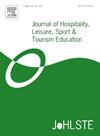A CLIL-based model proposal for a solution to English-speaking anxiety of gastronomy and culinary arts students
IF 4.1
2区 教育学
Q1 EDUCATION & EDUCATIONAL RESEARCH
Journal of Hospitality Leisure Sport & Tourism Education
Pub Date : 2025-05-29
DOI:10.1016/j.jhlste.2025.100559
引用次数: 0
Abstract
Proficiency in English is a critical requisite for gastronomy and culinary arts students and professionals seeking to excel in their profession. However, learners frequently encounter challenges such as anxiety, limited self-confidence, insufficient topic knowledge, fear of making errors, and concerns over peer judgment. Therefore, a mixed-methods study was conducted among 111 students enrolled in a gastronomy program at a Turkish state university during the 2023–2024 academic year, adopting an action research methodology to investigate English-speaking anxiety among this student cohort. A two-phase data collection approach was employed: first, a survey was administered to quantify students' anxiety levels while speaking English; subsequently, in-depth interviews were conducted to elicit reasons underlying their apprehensions. Following this exploratory phase, Content and Language Integrated Learning (CLIL)-based activities were designed and implemented to address the identified sources of anxiety, accompanied by reflection reports collected from participants after each intervention. These reports, coupled with expert feedback, informed revisions to the activities, allowing for a second measurement of anxiety levels post-intervention. The findings indicated that gastronomy students experienced English language anxiety stemming from perceived competence, fear of judgement, internalized psychological constraints, limited contextual learning, pedagogical and evaluation-based reasons. Notably, prospective female chefs exhibited higher anxiety levels compared to their male counterparts. Furthermore, the results revealed a significant decrease in anxiety levels among participants following the implementation of CLIL-based activities and tasks. These outcomes suggest that a CLIL-integrated gastronomy English course may effectively mitigate learners' anxiety during the learning process.
基于clil模式的烹饪与烹饪艺术学生英语焦虑解决方案
精通英语是烹饪和烹饪艺术学生和专业人士寻求在他们的职业中脱颖而出的关键条件。然而,学习者经常会遇到诸如焦虑、缺乏自信、主题知识不足、害怕犯错以及担心同伴评判等挑战。因此,在2023-2024学年期间,对土耳其一所州立大学烹饪课程的111名学生进行了一项混合方法研究,采用行动研究方法调查该学生群体中的英语焦虑。采用两阶段的数据收集方法:首先,进行一项调查,量化学生在说英语时的焦虑水平;随后,进行了深入的访谈,以找出他们担心的原因。在这个探索阶段之后,设计并实施了基于内容和语言综合学习(CLIL)的活动,以解决确定的焦虑来源,并在每次干预后从参与者那里收集反思报告。这些报告,加上专家的反馈,为活动的修订提供了信息,允许对干预后的焦虑水平进行第二次测量。研究结果表明,烹饪专业学生的英语语言焦虑源于感知能力、判断恐惧、内化心理约束、有限的情境学习、教学和评估原因。值得注意的是,未来的女厨师比男性厨师表现出更高的焦虑水平。此外,结果显示,在实施基于clil的活动和任务后,参与者的焦虑水平显著降低。这些结果表明,整合clil的美食英语课程可以有效缓解学习者在学习过程中的焦虑。
本文章由计算机程序翻译,如有差异,请以英文原文为准。
求助全文
约1分钟内获得全文
求助全文
来源期刊
CiteScore
8.10
自引率
10.80%
发文量
41
审稿时长
42 days
期刊介绍:
The Journal of Hospitality, Leisure, Sport and Tourism Education (JoHLSTE) is the leading international, peer-reviewed educational journal for this subject grouping. Its aims are to: a) Promote, enhance and disseminate research, good practice and innovation in all aspects of higher education in Hospitality, Leisure, Sport and Tourism and Events to its prime audience including teachers, researchers, employers, and policy makers. b) Encourage greater understanding, links and collaboration across its constituent fields. JoHLSTE is designed to have maximum impact through it being available on-line, fully archived and peer-reviewed. JoHLSTE is divided into seven sections: Editorial; Academic Papers; Practice Papers, Perspectives, Comments and Rejoinders, Research Notes and Reports and Education Resource Reviews.

 求助内容:
求助内容: 应助结果提醒方式:
应助结果提醒方式:


